|
|
| 'Like' us on Facebook | Follow us: |
Posted on: Nov 08, 2014
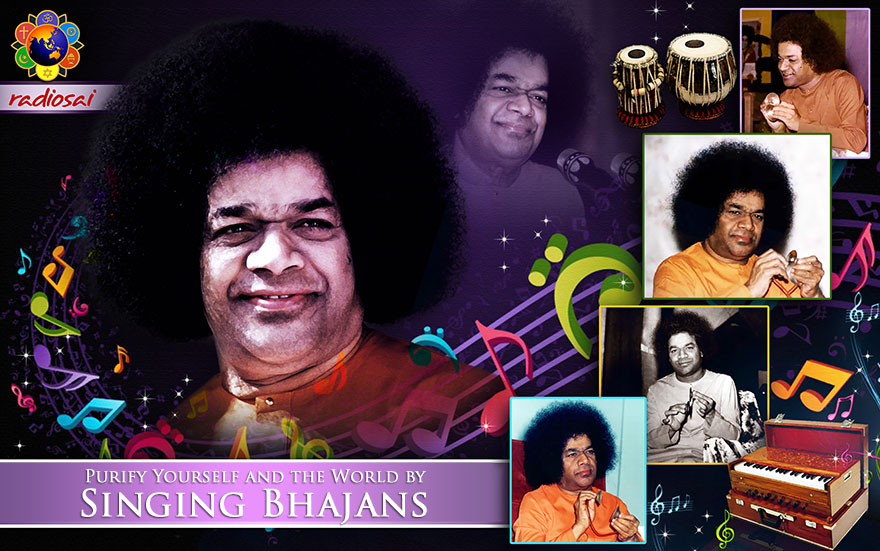 |
Much is spoken about Bhagawan's miraculous deeds and mammoth projects. It is believed most people attracted to Him are drawn either by His superhuman abilities or acts of selflessness. But there is one more aspect of Baba's message that has drawn and is still drawing people from different walks of life, cultures and age groups – Sai Bhajans. Sankirtan is an inherent part of the cultural fabric of India, but Bhagawan gave a new life to it by encouraging people to participate in Bhajans or in community singing as a primary means to redemption. He would say that in this modern era there is no Sadhana more effective than the chanting of God's name. Further He would explain, singing aloud the name of the Lord in the form of Bhajans is like placing a lamp on the threshold of the house; it illumines the within and the without. The name of the Lord brings peace to the one who sings as well as to those that listen. Also Baba insisted that Bhajans should not be just heard, it must be participatory. That is why in Sai Bhajans the followers of the Bhajans sing as much as the lead singers do; for this is not an exhibition of one's talent but a sacred act of worship that brings about 'unity and purity' which eventually leads to 'Divinity'. The act of singing together brings about unity, the divine name purifies one's thoughts and feelings, and all this is done to reveal the Divinity latent within us.
Talking on Bhajans (Sankirtanam) Swami in a discourse delivered on 3 March 1992 spoke of its importance and uniqueness. He also explained how and why we must participate in Bhajans. Swami said:
There is a big difference between Kirtanam and Sankirtanam. Kirtanam is an individual affair. It is singing by an individual for the fulfilment of his prayers. Sankirtanam aims at the well-being of the whole universe. This is also described as Samajika bhajans (community singing). This method of singing bhajans was first initiated by Guru Nanak, the founder of Sikhism.
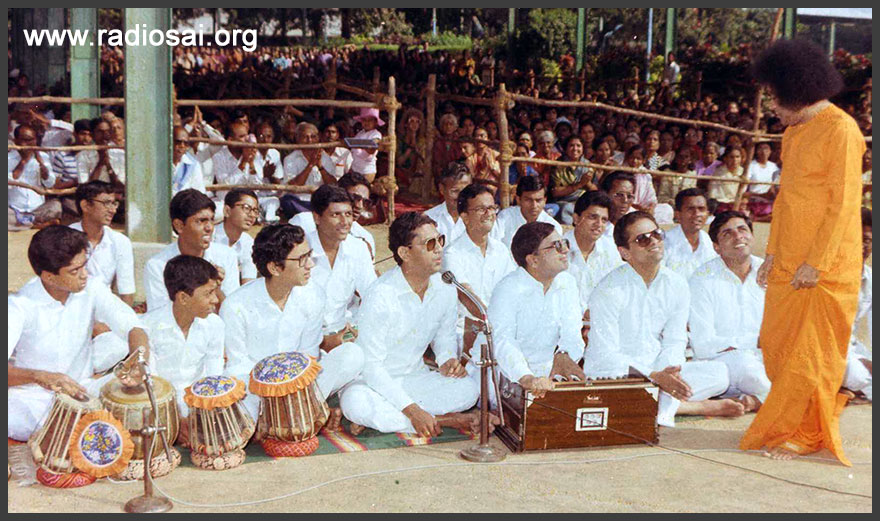 |
Different types of Sankirtana
Sankirtana is of four kinds: One is Guna Sankirtana; two, Leela Sankirtana; three, Bhaava Sankirtana; four, Nama Sankirtana.
Guna Sankirtana applies to the kind of bhajan in which the devotee recites the auspicious qualities of the divine, experiences oneness with the divine, and acquires the Godly qualities. Saint Thyagaraja had recourse to this type of singing.
Leela Sankirtana refers to the enjoyment by the devotee of the sacred sport of the Divine in ecstatic dancing and singing and being totally absorbed in it. This is exemplified by the Gita Govindam of Jayadeva.
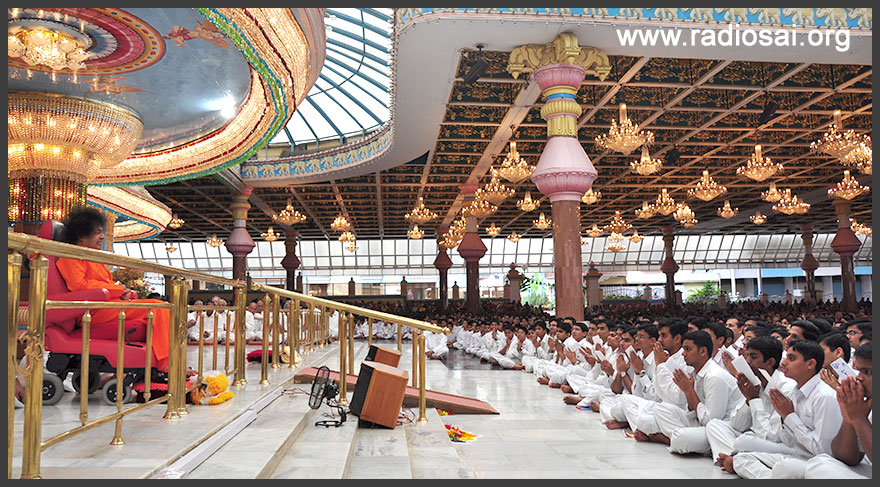 |
Bhaava Sankirtana: This is illustrated by Radha, who expresses her different feelings towards God and identifies herself with the Divine in every mood of devotion. Radha and Meera were the exponents of Bhaava Sankirtana.
Naama Sankirtana: Chaithanya was the exponent of this form of Keerthana. ‘All names are yours. There is nothing in this cosmos which does not bear the imprint of your name or form’ - Chaithanya revelled in singing the name of the Lord as signifying all that was beautiful and glorious in the universe.
While in each of the previous aeons the devotees adopted one or another methods of singing the glories, it is the supreme good fortune of the residents of Prasanthi Nilayam to enjoy all the four forms of Sankirtana. The bhajans sung here is a combination of all the four forms of Sankirtana.
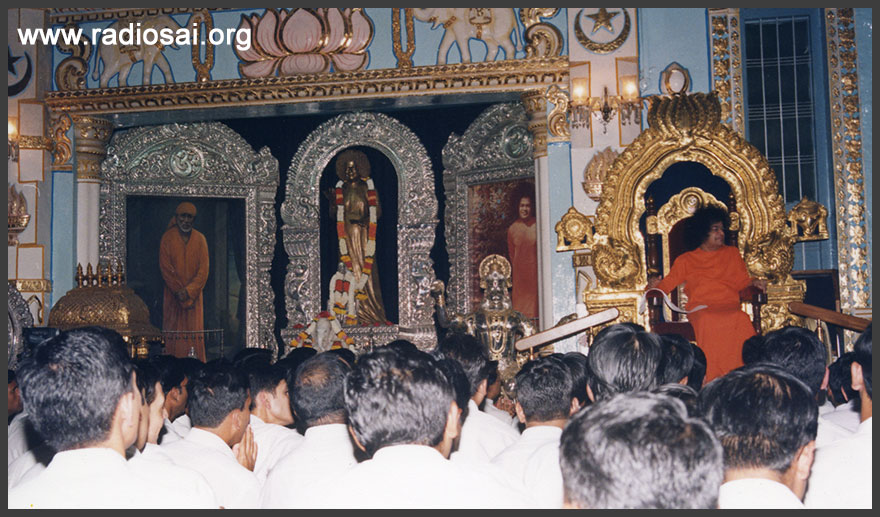 |
How Should We Participate in Bhajans
What then is the essence of Sankirtana? Its essential purpose is to earn the love of God. Combining one's voice, tune, feeling and rhythm to the appropriate beat of the song, the devotee should immerse himself in the singing. Harmonising the feeling with devotion and love, the sacred words of the song should be an outpouring of love towards God. That alone is devotional singing.
Everyone, whether well-versed in music or not, should listen attentively to the singer and try to repeat the words of the song with feeling. Some persons attending bhajans do not move their lips at all. They may say that they are singing the songs mentally within themselves. This is not proper. If you have devotional feeling, it should be expressed by the tongue joining in the bhajan. Only then can it be called Sankirtana - singing in unison with others. You must sing the names aloud, full throated, as far as the voice can reach. Only then the Divine will respond in full measure and shower His grace. No one will go to the rescue of a drowning man if his cries are feeble. Only when he cries aloud at the top of his voice will the cries be heard and people will rush to save him.
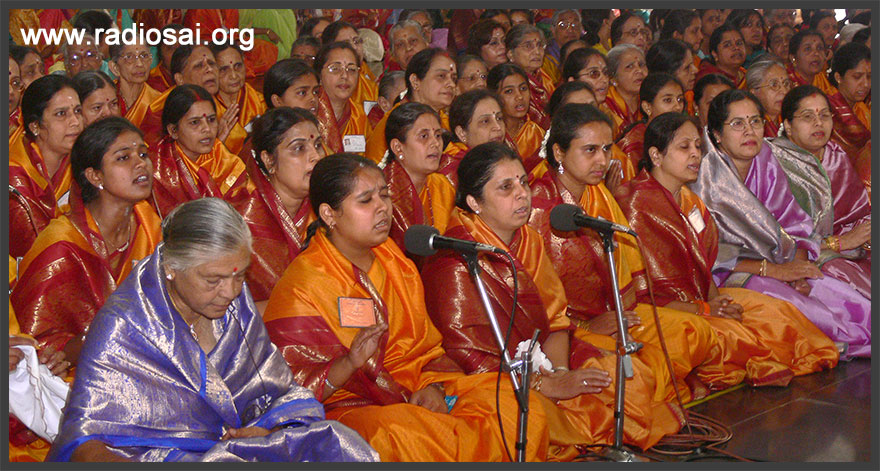 |
Sankirtana means singing with abandon and fervour. Everyone should realise that every limb and organ in the body has been given to man to be used for a sacred purpose - the tongue to utter the Lord's name, the hands to offer worship, the feet to go to the temple and so on. These organs should not be used for frivolous and unholy purposes. Sanctifying every one of the sense organs, man should purify the mind and contemplate on God.
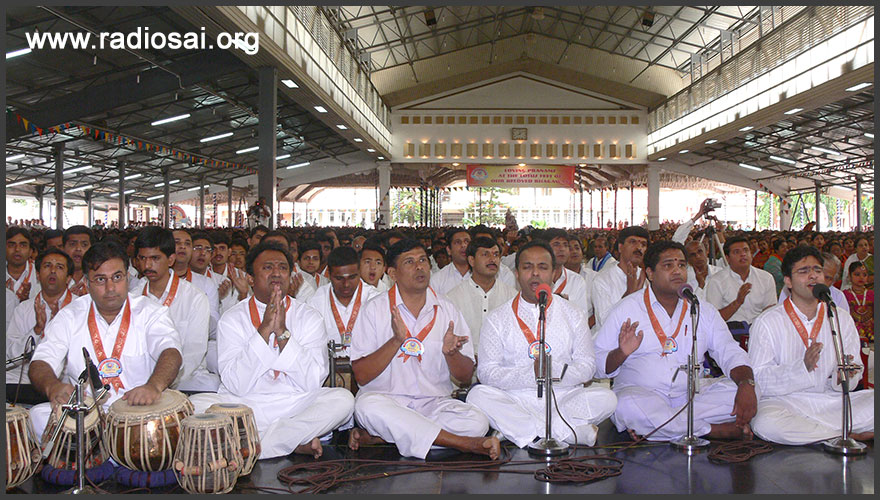 |
What Can be Achieved by Sankirtana
Today, all the five elements in the world - space, air, fire, water and the earth are polluted. You cannot get pure water or pure air. The sounds you hear are impure. The earth is polluted. The Kali Yuga has become Kalmasha Yuga (the age of impurity). To purify all these, the only means is chanting the names of the Lord.
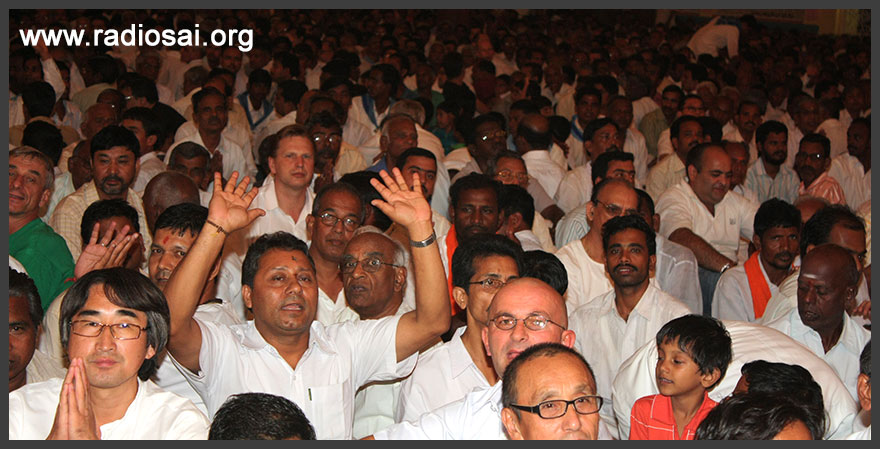 |
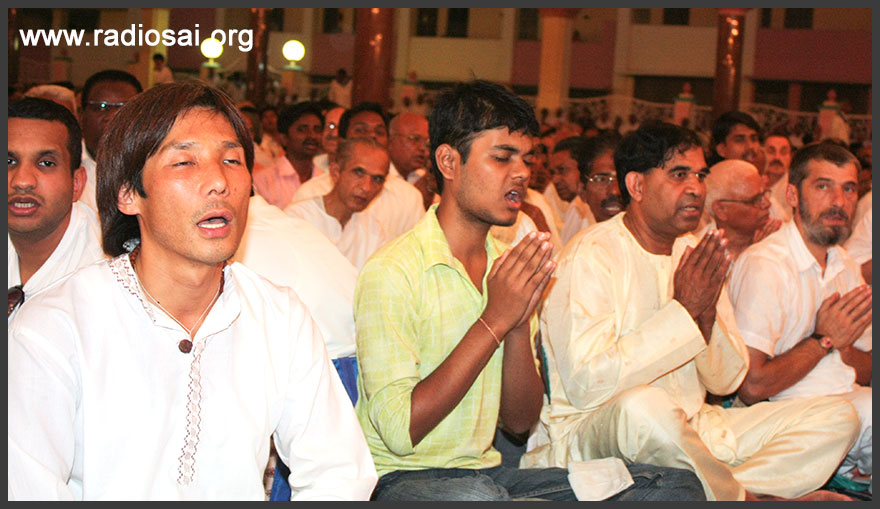 |
The recitation of the names of the Lord will help to purify the atmosphere as a result of the sacred sound waves getting absorbed in the atmosphere. The power of sound waves is evident from the way radio waves are transmitted and received over long distances. The atmosphere that has been polluted by impure sound waves can be purified by the chanting of the Divine Name. Likewise, sacred thoughts, pure speech and pure actions will purify other polluted elements. There is no better purifying agent than this. Crores (one crore is ten million) are being spent to purify the Ganges water. Of what use is this exercise if the Ganges continues to be polluted by the discharge of drainage water into the river? First prevent the flow of filthy effluents into the Ganges. In the same manner, the evil thoughts arising in the mind should be diverted; and it should be filled with pure, Godly thoughts by reciting the Divine name.
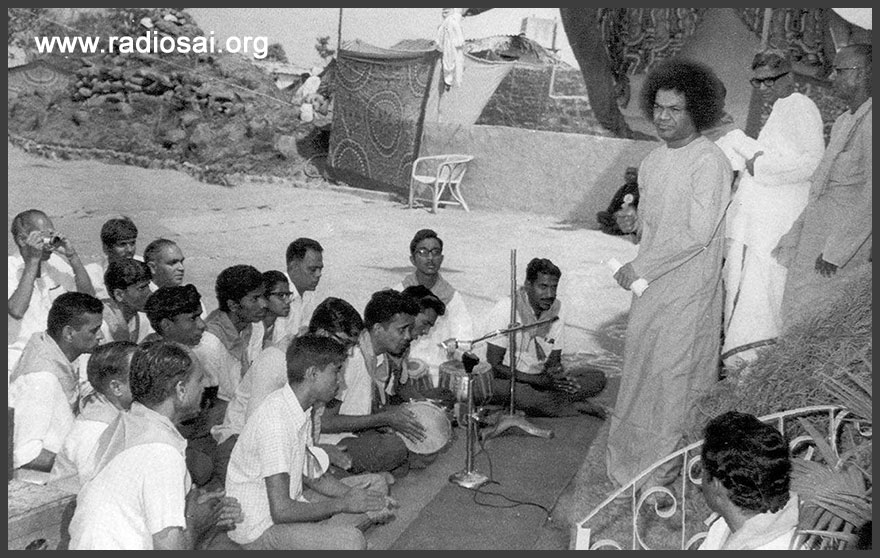 |
Everyone participating in bhajans should sing the name of the Lord and thereby serve to purify the atmosphere and promote the well-being of the nation.
We heard Swami tell us about Bhajans. What does He say about Akhanda Bhajans? The word 'Akhanda' means unbroken or uninterrupted. Bhagawan would often remind us that though it is commendable to participate in the Akhanda Bhajans, what one must strive for is to make one's very life an Akhanda Bhajan. One may attend to their duties in accordance to their roles in life, but the mind should ever be engaged in Namasmarana – Akhanda Namasmarana (incessant remembrance of the Lord's name). Just as one's breath is ceaseless, the chanting of the name too must be ceaseless. When we exert ourselves physically, we pant or breathe harder, don't we? So too, when in excitement – anxiety or exhilaration, we may think of the Lord with more intensity, but must think of Him at all other times too. This is the important message of Bhagawan, an emphasis of the message Krishna gave in the Gita when He told Arjuna, “Sarvesu kalesu Mam anusmara yudhya ca' – At all times, think of Me Incessantly; even as you take part in the battle. This is the message behind the observance of Akhanda Bhajan.
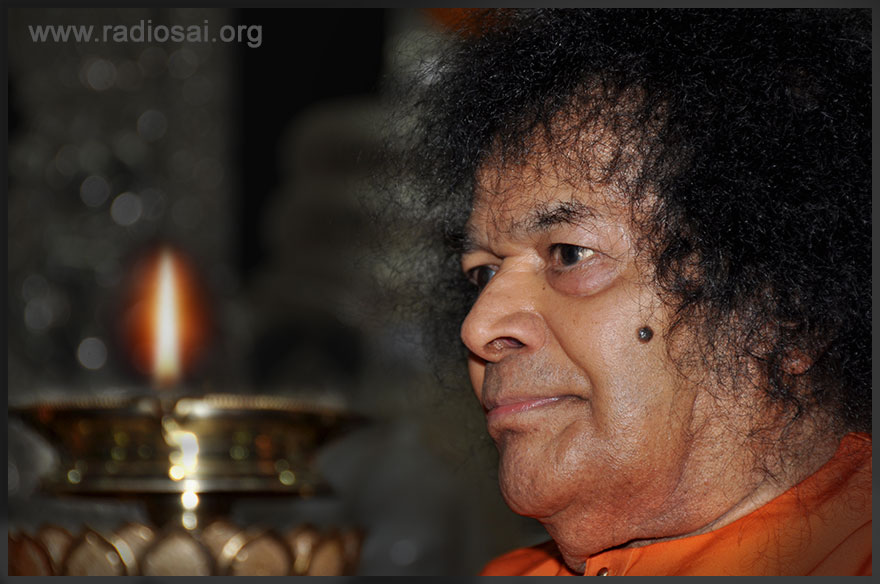 |
Even as we prepare to participate in this year's Akhanda Bhajan, let us realise what a great opportunity it is. Let us sing Bhajans the way Swami has asked us to and offer it to Him with all our hearts.
- Radio Sai Team
What do you think about this article? Please let us know by writing in to h2h@radiosai.org. Do not forget to mention your name and country.






